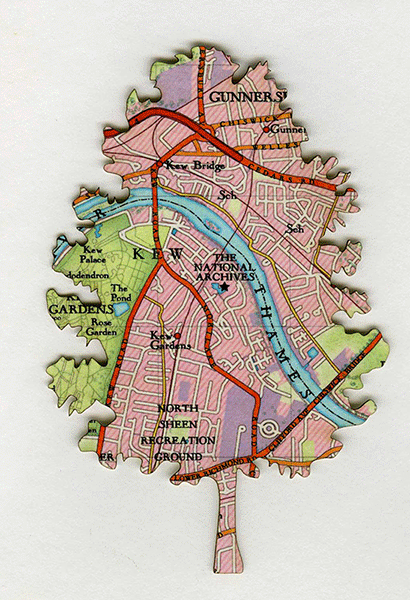
Detail of a greeting card from The National Archives
Genealogical research is so often a journey into the unknown. An exploration of those who have gone before. For most it is a chance to find out where you have come from, to spot likenesses and differences. Who doesn’t hope to find an illustrious ancestor, a royal connection or even a little scandal? A hope so frequently thwarted by the discovery that ones forebears were as dull as oneself. It is mostly a private quest, occasionally shared with family but rarely given a wider audience.
This month however I want to highlight some of the myriad of titles coming out just now where writers choose a public forum for their family secrets (or as my gran might have said, wash their dirty linen in public) to great and very readable effect.
First up A Life Discarded is perhaps the most innovative and intriguing. Think of this as genealogy as performance art: Audrey Collins channelled by Marina Abramović. Alexander Masters is given a collection of 148 diaries found in a skip. A life chronicled over more than 50 years. The daily minutiae, hopes, fears, doubts and dreams, the trip to the shops. But not, of course, a name; diaries are a personal record, you have no need to tell yourself who you are. Masters’ challenge is to identify the writer. However Masters is no genealogist. He wilfully spurns such obvious tools as the census or even the simple logic afforded by putting the diaries into chronological order and carefully noting clues as revealed. No: he dips in and out, hares off after red herrings, draws pictures based expressions of self-doubt about hair styles or the shape of glasses’ frames and consults a graphologist. It is a maddening, frustrating but most of all eminently readable quest. And he comes to a very surprising conclusion.
The next two are writers whose family stories involve secrets many might consider best hidden, but which the authors bravely share. Francis Beckett’s Fascist in The Family is Beckett’s head-on confrontation with his own father. John Beckett was a complicated individual: a walking contradiction, a Jewish anti-Semite, a fantasist who lied often and even to himself, a democrat who ended up an intimate of Mosley’s fascists. Francis questions why he undertakes his study: why not just bury the past? But he concludes that, now more than ever, it is important to:
‘…work out people’s reasons for action or the justifications they make to themselves. Only thereby can we learn how to deal with such people in the future.’
Cal Flyn faces a similar challenge when she researches her grandfather Angus Mcmillan, one of Australia’s founding fathers, in Thicker Than Water. Angus was driven from his Highland home by the 1830s clearances. Young, brave and idealistic he went out to Australia to help found a new society. He stands out against unfair treatment of the convict labourers and helps to chart out new territories, but something darker intrudes and Cal uncovers his involvement in Aboriginal genocide. While never condoning his in inexcusable behaviour, she does try hard to understand how he could have come to do what he did and makes some valid points about triggers which made good men go bad in a world so very different from our own. This is an absorbing family history coupled with a sensitive exploration of dealing with the sins of the fathers.
Someone who hit pay dirt on the famous ancestor front was Jane Wellesley. Her chronicle Wellington: A Journey Through My Family romps through six generations of bravery, madness, adultery and eccentricity. Naturally the first Duke is explored here, but equal time is given to to the line of fascinating characters he sired, including the woman who abandoned her family for Vita Sackville West, an MI6 spy and the great grandfather who used an elephant to pull his lawn mower. Jane shares her family history journey with her own father, a quest that draws them closer together.
Another father-daughter family story is Dadland by Keggie Crew. I’ve written about this before so won’t revisit it now, but do note that Keggie will be talking about her book at The National Archives on Thursday 11 May – put the date in your diary now, it promises to be a treat.
And finally have a read of Their Promised Land Ian Baruma’s book about his grandparents. Using very personal family letters Baruma crafts a work of social history examining the lives of German Jews in Britain during two world wars. In essence this is a love story, a charming chronicle of the love of Bernard and Winifred and of Ian’s own love for ‘Bun and Win’, two truly amazing individuals. As so often the stories of real people bring history alive.
If these books have inspired you, look to your own research and ask if your family story is worth sharing.
